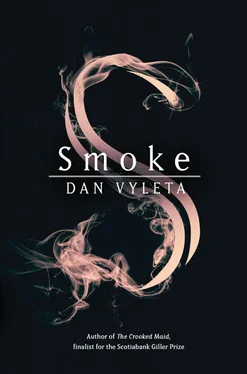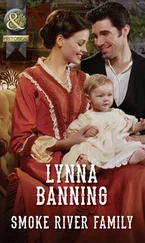“It’s not like it was down the mine,” Livia says, disappointed. “I had started to hope that Smoke was benign.”
“And now you are shocked.”
“Well, look at it,” Livia answers. “It’s a disgrace.”
“I was just thinking the opposite. That it’s not really that bad.”
Just as Thomas says it, two women at the far end of the square start fighting, the shorter, stockier woman wrestling the other to the ground then pelting her with insults.
ф
They choose a perch atop a set of shallow stairs that lead up to a church. Church does not capture the building’s scale; it is very nearly a cathedral. A row of marble columns rise behind them, holding aloft a portico high above their heads. Beyond it a single tower spikes two hundred feet into the heavens, where the Smoke thins and a cloudy sky spews snowflakes that reach the earth as dirty drizzle. For all its grandeur, the building is dilapidated, its great doors leaning burnt within their frames, held aloft by a crude patchwork of timber. The windows, too, have long lost their glass and are similarly boarded shut. High up, the brickwork that peels itself out of the city’s sooty varnish shines with the pallor of limestone. The long, angular lines of the 1720s: built a hundred years into the time of Smoke. Thomas stares at the church and imagines a time when, despite it all, a decision was taken to build it here, at the heart of vice.
Morning turns to afternoon and Charlie does not come. Dawn, noon, dusk: these are the meeting times they have agreed. They shall have to leave soon, to look for food and shelter for the night. There is a water pump on the market square and though the water is grey and tastes of tin they have gone down to it repeatedly, to slacken their thirst and fill up their stomachs with something other than air. To obtain food, they will need to raise money. Or else they will have to steal. It is a problem, Thomas imagines, faced by a great many Londoners.
A man approaches the stairs. It takes Thomas some time to understand why he notices him. There have been others walking past, some openly staring at them, assessing their wealth, their station. Others yet have sought out the stairs as they have: as a place to rest. One old woman sat to feed the pigeons from a tin of dug-up grubs, cooing sweet nothings and all the while gently smoking from the shafts of her high boots.
This man is different. He moves briskly without wishing to disclose his haste, as though he is straining at the lead of his own discretion. A man in his fifties, bald, a crick in his neck that tilts chin to shoulder. But it is not this that draws Thomas’s eye. He only makes sense of it after the man has turned and darted down the alley by the side of the church. Everyone else who walked towards them, past the various islands of spectacle that dot the square, veered off somewhere, even if only for a moment. The Smoke made sure of it: it called to them as they passed, pulled them towards its centre, as though they were celestial bodies passing the weight of the sun. In his repressed hurry, walking through the siren song of sin, this man alone — the man with the bent neck — never once veered.
He is eating sweets.
There can be no other explanation. But something else tugs at Thomas, a memory older than the discovery of sweets, if not by much.
“Charlie,” he says abruptly, startling Livia out of her doze. “He once told me he saw an angel. Right here on the market square. An angel with a crooked neck.”
Livia stares after Thomas when he jumps up and runs to the alley. But the man is long gone.
“Is he important?”
“Charlie thought so,” Thomas replies. “In any case, it’s more than just chance. Two sightings on the very same square. He must have business here.”
ф
Soon after, Thomas and Livia are spooked off the perch by a group of respectably dressed men traversing the market in an open landau marked with bold lettering and the symbol of the Crown. There are four of them, plus a driver in livery; each so obviously a gentleman with soft white skin and brushed moustaches, they might as well belong to a different breed of human altogether.
“Who are they?” Livia whispers in the alley to which they have fled. “Magistrates? Are they looking for us?”
Thomas reads the lettering on the side of the coach. TAYLOR, ASHTON AND SONS, ENGINEERING. His relief is immediate.
“No. They are sewage men.” He repeats to her the gist of Renfrew’s explanation, given in Oxford some weeks ago. “Liberals. Social pioneers. They want to clean up London, starting with the cesspits.” He shrugs. “That’s what Renfrew was preaching to us. That we should join their ranks. He did not tell us that they’re here because they’d like to have a go at corruption and can’t afford any cigarettes.”
“Perhaps we are doing them an injustice.” Livia watches the carriage disappear at the far end of the square. “They looked like honest men.”
“They looked clean, Livia. That’s all.” He shrugs, tugs at her elbow, walks back out into the street. “I’m famished. Let’s go find some food.”
ф
For the second time in two days Thomas makes an inventory of his belongings and tallies up what he might sell. His penknife. His jacket, only he’ll freeze to death if they don’t find better shelter for the night. The cigarettes Livia picked out of the dirt. They are said to be worth a fortune. But who needs to buy sin in London? It’s as free as the air they breathe.
The row of market stalls on the square only sells raw meat and vegetables, and fish so malodorous even the locals seem to avoid it. They choose a street at random, follow a pair of chimney sweeps who are either the most vicious of men or are simply trailing the dirt of their trade. A bakery draws them with its smell. The penknife buys them two loaves of coarse white bread and a dozen penny rolls. They gulp down the rolls while huddled into a doorway, until a gang of urchins sets on them, begging a loaf with such dirty-palmed insistence that they have no choice but to flee.
And so they drift, strangers in a strange place. Around them the city is working, talking, seeking pleasures. It is not, in some ways, unlike the bustle of a school corridor or of a holiday fair in a respectable village. Only here, every interaction — every word spoken, every coin that changes hands — hovers at the precipice of danger, and moods can shift with the gust of the wind. They walk through arguments; through drunkenness; through laughter; skirt a billow of raw lust, a couple kissing, her hands buried in his jacket, one naked hip bone sticking out into the cold. And at every step, Smoke calls to Thomas, a dozen shades of vice.
It happens like all accidents, suddenly and without warning. Perhaps it is no accident at all but an ambush, well-rehearsed and executed with aplomb. A group of running urchins splits them (the same group as before? another?), shoves Thomas up against the wall and Livia into the kissing couple. She loses her balance and all three fall hard into the street. And even as they fall the man’s hands slip into Livia’s pockets, searching them for coin. He discovers what Thomas did a day before; that the shapeless coat hides something softer than a boy’s frame; grins, his fallen lover’s skirts tangling around his legs, licks the length of Livia’s face, jumps up, is gone, dragging his woman behind him, her cheeks painted crimson in imitation of health. All this in a breath or two, while Thomas swims against the crowd, the last of their bread spoiling in a puddle by his feet. He reaches Livia, drops to his knees, finds her head twisted into dirt, the neck strangely tilted; scoops up her chin with outstretched palms, afraid. The moment they touch a jet of Smoke breaks out of her, dark green and dense. His own skin answers. They freeze, their faces conjoined by a twist of Smoke so dense they cannot see each other. It is Livia who recoils, shaking off his touch, kicking his legs in her haste to get away.
Читать дальше












